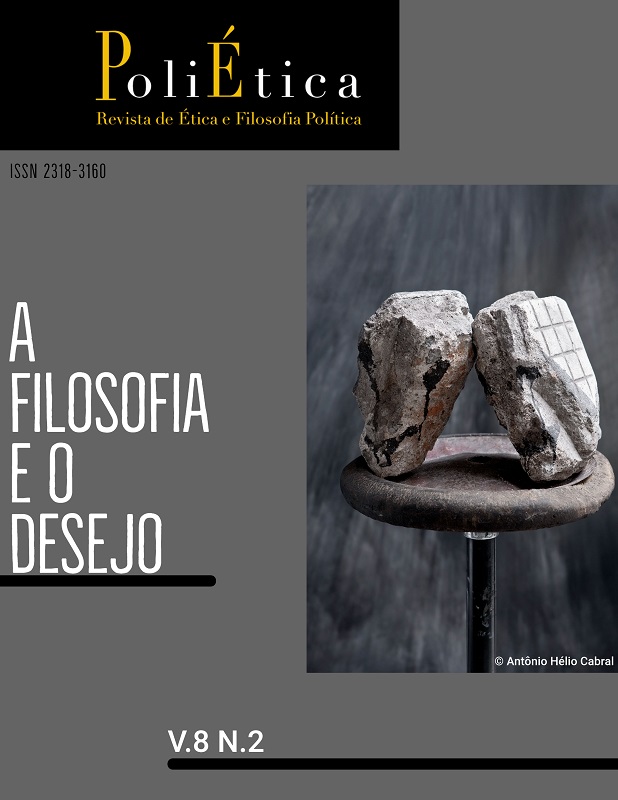image and Imaginary in Cinema: Anthopological perspectives and the rescue of subjetivity
DOI:
https://doi.org/10.23925/poliética.v8i2.52127Keywords:
Cinema, Aesthetics of Movement, Imagination-Imaginary, Awareness, Anthropological experienceAbstract
Cinema, as a language (mediation of symbols and signs) and affirming it as worldview and creation in relation to the viewer (anthropological experience), will be understood from an aesthetics of movement. Through the inevitable spectacle-spectator relationship to cinematographic Art and its filmic experience, the conditions to think of an aesthetics in an ontological dimension will be presented: the singularity in the condition of imaginary signifier from its presence in the world (rescue of the collectivity). For this analysis, the Sartrean existential phenomenology will be of great value to establish a dialogue with other authors (Merleau-Ponty, Jean Mitry, Edgar Morin, Christian METZ) and reflect on an aesthetic of the cinema from the notions of perception, consciousness, image, imagination and desire in the field of a convention illuminated by an aesthetic of life. Finally, presenting Cinema as a deeply existential practice, the importance of the sensation of the collective that derives from cinematographic Art and the implications of the spectator in the dimension of responsibility and the engagement of being in the world will be recalled – Cinema as a philosophy of action.
References
CHNAIDERMAN, Mirian. Ensaios de psicanálise e semiótica. São Paulo: Editora Escuta, 1989.
FOUCAULT, Michel. Estética: literatura e pintura, música e cinema. In: Ditos e Escritos, III. Organização e seleção de textos de Manuel Barros da Mota; Tradução de Ives Autran Dourado Barbosa. 2ª Ed. RJ: Forense Universitária, 2009.
MERLEAU-PONTY, Maurice. Le cinema et la nouvelle psychologie. In : Sens et non-sens. Paris : Éditions Gallimard, 1996.
METZ, Christian. A significação no cinema. Tradução de Jean-Claude Bernadet. São Paulo: Perspectiva, 1972.
METZ, Christian. O significante imaginário: Psicanálise e Cinema. Tradução de António Durão. Lisboa: Livros Horizonte, 1980.
MITRY, Jean. Estética y Psicología del cine: 2. Las Formas. Traducción de Mauro Armiño. Madrid: Siglo Veintiuno editores, 1984.
MITRY, Jean. Estética y psicología del cine: 1. Las estructuras. Traducción de René Palácios More. Madrid: Siglo Veintiuno editores, 1996.
MORIN, Edgar. O cinema ou o homem imaginário: ensaio de Antropologia. Tradução de António Pedro Vasconcelos. Lisboa: Moraes Editores, 1980.
SARTRE, Jean-Paul. Situations I. Paris: Gallimard, 1947.
SARTRE, Jean-Paul. Dimensión sobre la crítica acerca de La infancia de Iván. In: Situations, VII: Problemas del Marxismo 2. Buenos Aires: Editorial Losada, S.A., 1966.
SARTRE, Jean-Paul. A imaginação. 6 ª ed. São Paulo: DIFEL, 1982.
SARTRE, Jean-Paul. Les Carnets de la Drôle de Guerre: Novembre 1939-Mars 1940. France: Gallimard, 1983a.
SARTRE, Jean-Paul. Cahiers pour une morale. Paris: Gallimard, 1983.
SARTRE, Jean-Paul. Verdade e Existência. Tradução de Marcos Bagno. RJ : Nova Fronteira, 1990.
SARTRE, Jean-Paul. Apologie pour le cinema. Défense et illustration d’un art international. In : Écrits de Jeunesse. Paris : Gallimard, 1990a.
SARTRE, Jean-Paul. O Imaginário: Psicologia fenomenológica da imaginação. Trad. Duda Machado, Sâo Paulo: Ed. Ática, 1996.
SARTRE, Jean-Paul. L'être et le néant: essai d'ontologie phénoménologique.France: Gallimard, 2001.
SARTRE, Jean-Paul. Crítica da Razão Dialética: precedido por Questões de Método. Trad. de Guilherme João de Freitas Teixeira. Rio de Janeiro: DP&A, 2002.
SARTRE, Jean-Paul. La transcendance de L'Ego: Esquisse d'une description phénoménologique. Paris: VRIN, 2003.
SARTRE, Jean-Paul. Que é a literatura? Tradução de Carlos Felipe Moisés. São Paulo: Editora Ática, 2004.


